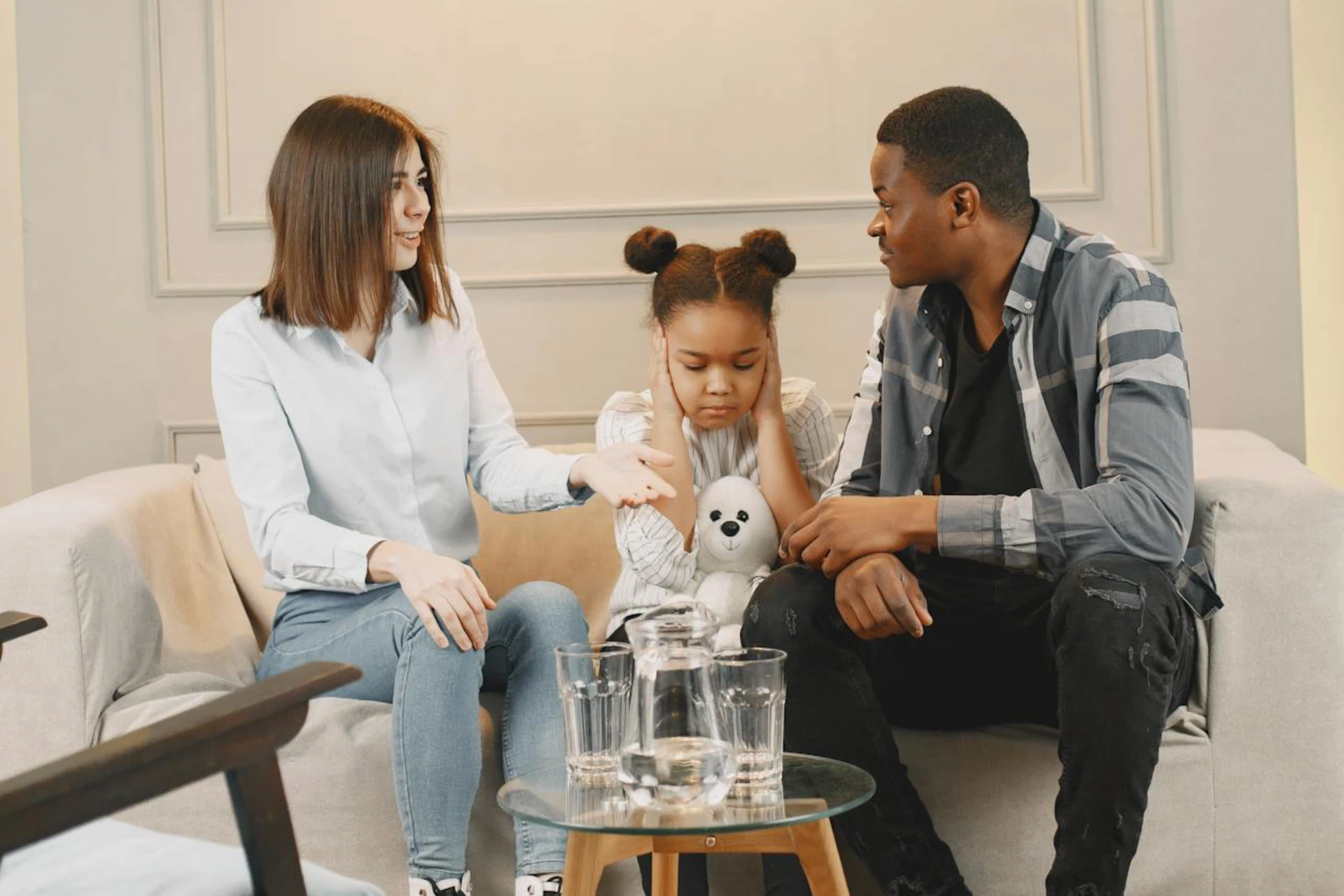A healthy and nurturing family environment is necessary for the development of mental health in children. A positive atmosphere within the family, such as open communication, strong interpersonal relationships between parents and children, contributes to a conducive and a safe space for children to develop healthy habits. Alternatively, persistent and unresolved conflicts can foster a harmful environment that threatens a child’s mental health.
What is Parental Fighting?
No long-term relationship is without conflict. For many, fighting, arguing, or really any type of conflict is seen as problematic, a sign of trouble in a relationship. However, it doesn’t have to be.
In fact, conflict can be considered a good thing. When a relationship is without conflict it usually means someone has stopped trying and the relationship is severely broken. Trying to prevent conflict from showing up is simply not an option. What we can control is how we deal with issues as they arise. Our ability to manage conflict with our partner can make all the difference.
How you fight with your partner matters. This is especially true when children are present. Your conflict will impact them for better or for worse. Research shows that when parents argue, it impacts children — but the type of impact can depend on whether the conflict is healthy and productive or negative and harmful.
Lead researcher from the Univerity of Vermont’s Department of Psychological Sciences explains “Compared with abuse and neglect, inter-parental conflict is a less severe, less traumatic experience, but it is also more prevalent, and therefore has implications for a larger portion of the population.”
Effects of Parental Fighting on Children
Maslow’s Hierarchy of Needs lists safety and security as the next important after basic survival needs like food water, and shelter. Children need stability. For a child, their parents are supposed to give them that, along with other basic needs – safety and security. When children see their parents fight, they feel less safe. Their sense of security seems threatened.
Some research suggests that children as young as six months register their parents’ distress. Studies that follow children over a long period of time show that children who were insecure in kindergarten because of their parents’ conflicts were more likely to have adjustment problems in the seventh grade.
Physical Health
The stress of living in a home where parents are constantly fighting can have negative effects on a child’s physical health. Children can suffer from headaches, stomachaches, and sleep disturbances as a result of parental conflict. The physical impact can carry into adulthood. Research has found that children exposed to ongoing parental fighting re more likely to to report vascular and immune problems as adults.
Behavioral Problems
Children who experience regular parental conflict may display behavioral issues such as aggression, disobedience, or acting out. They may also have trouble focusing or performing well in academics.
The Impact of High-Conflict Families on Children’s Mental Health
Children who are exposed to constant conflict, aggression, abuse, domestic violence are likely to present with behavioral and emotional problems.
Anxiety & Stress
Children may feel sad, anxious, scared, or stressed when they witness their parents fighting. This can lead to emotional instability and difficulties in managing their own emotions.
Depression & Low Self-Esteem
Witnessing conflict between parents can affect a child’s sense of self-worth and lead to feelings of insecurity and self-doubt. This can impact their confidence and relationships with others. The feelings of low self-worth can be carried into adulthood.
Long-Term Trauma & Post-Traumatic Stress Disorder (PTSD)
Most people tend to attribute trauma or PTSD to violent or life-threatening situations. However, for children living in high conflict homes, the potential for suffering from long-term psychological effects following parental conflict is similar to children who have experienced natural disasters.
Signs Parental Arguments Are Affecting the Child
It’s critical you can identify the signs suggesting that your child is being impacted by parental conflict. After identifying, you should address it as a family and offering support. Signs your child is suffering from parental conflict include:
- Changes in Behavior: They may be more withdrawn, irritable, or display increased aggression
- Decline in Academic Performance: Your child’s grades decline or they show a general lack of interest in school
- Regression: They may revert to earlier stages of development such as wetting the bed
- Emotional Distress: They may display symptoms of anxiety and/or depression or become prone to mood swings
- Physical Distress: They may complain of feeling sick more often or having unexplainable aches and pains such as stomachaches, headaches, and cramps.
- Fear of Conflict: They may avoid situations that could be confrontational and/or try to minimize contact with parents to minimize the risk of conflict
- Difficulty with Relationships: They may harbor serious trust issues, isolate themselves or display aggression with others.
Tips to Reduce Effects of Fighting
Conflict with your spouse is inevitable. When children are thrown into the mix, the opportunity for conflict can grow. You might be more tired or stressed, trying to balance being a parent, with being a wife. It can feel as though your relationship is on the back burner, and romance has left the building. That can cause people to lash out and pick a fight when really they’re seeking closeness.
Conflict is usually born on its own (unless one person is looking to fight). Since we can’t predict the future, we can’t predict when conflict will arise. Therefore, your child might be present when things start to get heated. When tension builds and a quarrel is brewing, know that you have options before entering “fight mode”. You can decide if you want to:
1) Give in, in hopes of completely diffusing the conflict. Example: “Okay, you’re right”.
2) Table the argument for another time. Example: “This is important to me, but let’s discuss it later”.
3) Ask your child if you can talk privately, and continue with your partner in a separate room.
4) Have the conflict play out with your child present.
The fourth option is only a good option if your conflict is considered healthy.
Destructive Conflict vs Healthy Conflict
Believe it or not, conflict can be healthy. One of the biggest differences between healthy and unhealthy conflict is how you feel after. Healthy fighting leaves partners feeling closer, having gained a better understanding of each other’s needs and feelings.
Benefits of healthy fighting:
– Shows you care
– Improves bond
– Learn more about each other
Unhealthy fighting, on the other hand, leaves lingering issues and emotional distance. If you’re repeatedly engaging in unhealthy or destructive conflict your relationship is surely suffering.
Tactics used in unhealthy conflict:
- Verbal aggression like name-calling, insults, and threats of abandonment;
- Physical aggression like hitting and pushing;
- Silent tactics like avoidance, walking out, sulking, or withdrawing
Healthy Parental Conflict Can Benefit Kids
When parents have mild to moderate conflict that involves support and compromise, along with positive emotions, children obtain better social skills and self-esteem. They also benefit from increased emotional security, and develop better relationships with their parents. They may also do better in school and have fewer psychological problems.
Resolving an issue in front of a child can be highly beneficial. In fact, when parents fight and resolve the problem, the child may be happier than they were before the conflict began. This is because the child is given reassurance that their parents can work things out, even in times of stress. Their sense of security is not only restored, but improved. Even if a clear resolution cannot be reached, progress towards resolution is helpful.
Tips to Resolve Conflict
Sometimes conflict cannot be avoided. How you go through the process is critical. Even with good intentions, the wrong approach can turn a small issue into a massive one. A new issue can spring up from the original because of how someone was spoken to. Now the new issue could be someone’s tone of voice, silence, or insult.
The first step is to identify what the real issue is. The focus should be on one thing only. It is not an opportunity to bring up other things from the past. While you may be reminded of something else that bothered you, refrain from adding that to the mix. When you steer away from the single issue at hand, you’re unlikely to reach a resolution.
Use “I” Statements
Refrain from pointing fingers, and starting every line with accusations. “You did this.” “You don’t…” “You are…” Make it about how you feel. How did their words or actions make you feel? Try “I feel…” and “I want…”. This will help your partner understand where you’re coming from and not force them to feel under attack.
Assume Your Partner Has Good Intentions
Sometimes we forget that our partner is on our team. We can forget that they don’t enjoy conflict. They don’t want you to be upset. Remember that your partner is just that, your partner. You both want a happy, healthy relationship. To get that you have to work together, not against each other.
Up Your Listening Game
Practice active listening. You can do this with your body. Face them completely while they talk. Make eye contact. Keep your posture open (uncrossed arms). Nod as they talk. Show that you’re interested and invested by asking questions both to get more information and to confirm that you’re understanding them correctly.
Stop Playing Defense
It can be hard not to get defensive when your partner shares a complaint about you. You may also be tempted to throw a complaint or negative comment back at them. Example: “You don’t clean the kitchen.” You don’t know what you’re talking about”. Hear them out fully, first. Ask questions.
Don’t Get Ugly
Never resort to contempt- name-calling, sarcasm, eye-rolling, and smirking. These things tell your partner you don’t respect them. In addition, they keep you from having a productive conversation. You’re likely to anger your partner as well, removing any chance of solving the issue.
Step Into Their Shoes
In addition to listening to them, you need to try to see their perspective. If you can understand where they’re coming from, you’re less likely to get angry during conflict.
Avoid Generalizations
Saying “You never…” and “You always…” can feel right to you when you feel like you’ve been unfairly treated, misunderstood, or unseen by your partner. But these are generalizations and a surefire way to put your partner on the defensive.
Inject Humor
Make them laugh. Not because you want to distract or seem uncaring about the current issue, but because it can help relieve tension and remind you of why this is worth sorting out – you love and enjoy each other.
Read the Room
Look for signs that one of you is getting overly upset, and suggest a break to calm down. Sometimes a 5 minute walk can prevent you from saying something hurtful or it can help you find the right words to explain how you feel.
Therapy Can Help
Be mindful of how you fight with your partner. Is it fair? Can you identify with the following? These are signs you might not be fighting fair:
- During a fight, you see your partner as the enemy instead of your teammate
- You speak in absolutes, like “always” and “never”
- You resort to personal attacks like name-calling
- You’re too focused on defending yourself to hear what your partner is saying
- You make assumptions or tell your partner what they think or feel
- You’re stuck on who’s right and who’s wrong instead of finding a solution
The Couples Center can help. We have a team of experienced therapists skilled in teaching you how to manage conflict in a healthier way, thus minimizing the negative impact on children. Managing conflict with empathy, open communication, compromise, and a shared commitment to the relationship not only improves your relationship with your partner but will set a positive example for your child.

 Call Us Now
Call Us Now



